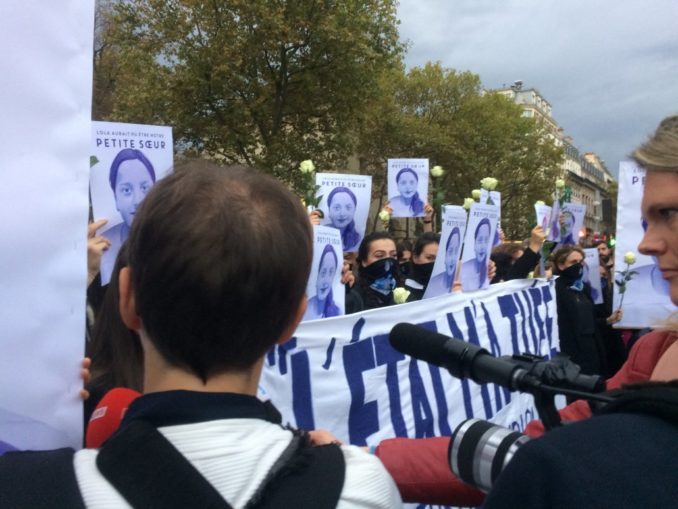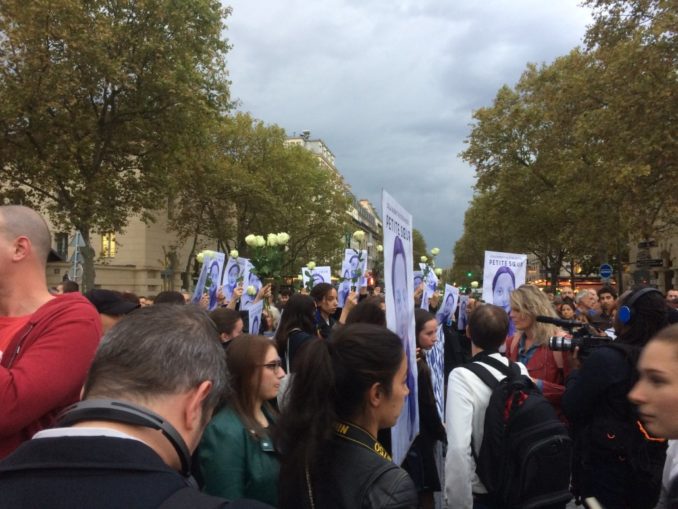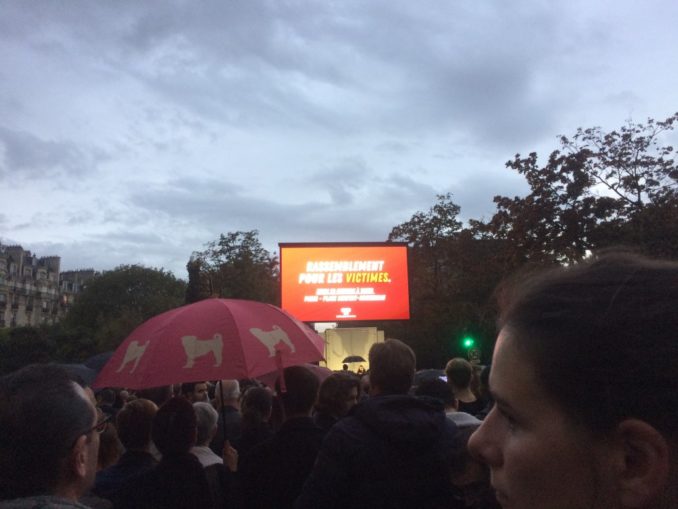
“There’s a form of tolerance that’s worse than syphilis, worse than
murder, worse than madness.”
On October 20th, 2022, I and thousands of like-minded people stood in the pouring rain on Place Denfert-Rochereau to pay homage to yet another French child butchered by an illegal immigrant.
Lola Daviet was just 12 years-old and France’s junior aerobics champion. She had two brothers, Jordan and Thibault. Their parents, Johan and Delphine Daviet, had left their village near Calais to come to Paris and work as caretakers of a large modern building on Rue Manin in the Nineteenth Arrondissement. Here I must pause to explain that Rue Manin, which borders the Buttes Chaumont park, is not at all rough but on the contrary has some of the most expensive real estate in Paris, gigantic flats with panoramic views of the park, worth several million pounds. The Rothschild Hospital is located on that very same street. Lola attended College Georges Brassens, a high school barely ten minutes from home.
On Friday, October 14th, Mr Daviet started worrying when at three o’clock Lola still had not come home from school. This was unusual. On Fridays, her last lesson ended at half past two and she was normally home by two-forty. He phoned the school to inquire whether Lola had been delayed. No, he was told. His daughter had left right after the bell ring and been seen walking homewards. Mr Daviet then called his wife who was busy in another part of the building.
Delphine Daviet took Lola’s absence seriously. Taking a photograph with her, she went to the nearest police station to report her daughter missing. The police reacted in their customary offhand manner: the girl would turn up later, she was probably somewhere necking with her boyfriend.
Mr and Mrs. Daviet did not believe this for even a minute. Lola was only twelve and showed no interest in boys. Back home, Mr Daviet asked neighbours whether they had seen Lola. No one had.
Around five o’clock, his anxiety mounting, it occurred to him to check the building’s CCTV tape of which, by the way, he was in charge. Lola was shown walking through the door at precisely two-forty, immediately followed by an unknown young woman. A few minutes later, the same woman pushed the child into the lift and, when the reached the upper floor, into a flat.
Mr Daviet ran to the police station with the video tape while Mrs. Daviet posted a missing child notice on FaceBook. Confronted with unmistakable evidence of Lola coming home at the usual time, the police finally agreed to take action. They searched the building from top to bottom, but found no trace of the missing child. When a box cutter and a roll of electric tape were discovered on the basement floor, one officer later confided, the mood suddenly turned grim.

At eleven-thirty that night, a homeless man came to the station to report a plastic chest with what looked like a human body inside on Rue Hautpoul, just around the corner from Rue Manin. At two in the morning, the police informed Mr and Mrs. Daviet that their daughter had been found dead.
The autopsy revealed that Lola had been sexually assaulted then asphyxiated. Her body was covered in post mortem injuries, mostly cuts and blows. The killer had attempted to sever her head and dismember her. Curiously enough, the figures one and zero had been painted with red nail polish on the soles of her feet.
The first person to be arrested was the tenant of the flat which Lola was shown to be pushed into on the CCTV video. Friha Benkired was a 26 year-old illegal immigrant from Algeria who worked at a bakery and sublet a studio-apartment from an acquaintance. She identified the woman on the video as her younger sister Dahbia who stayed with her from time to time. Friha Benkired was released soon after her arrest as she had been at work all day on that fateful Friday. Still, we shall come back to her.
Dahbia Benkired was arrested at the Bois-Colombes (a Paris suburb) flat of a friend. Later an unlicenced taxi driver who had taken her to the suburbs as well as an on and off boyfriend of Benkired’s were also taken in for questioning. The homeless man who had found the crate was briefly suspected of involvement in the murder, but that theory was quickly dismissed and the man cleared.
Dahbia Benkired (whom the mainstream media persist in calling Dahbia B. to this day) was born in Algiers in 1998. She came to France legally on a student visa in 2016 in order to study French cookery. Needless to say, she never completed her course and never received her degree. Her former French teacher describes her as “a pathological liar who cut classes ninety percent of the time.”
Where she lived and how she supported herself all those years is not clear. She is portrayed in the mainstream media as a homeless and jobless victim of domestic violence. Yet, a couple of days after the murder, it emerged that she made Tiktok videos of herself wearing designer clothes of the most expensive sort and dancing in a large luxurious flat.
Benkired claims that she stayed with various relatives or acquaintances, moving from place to place every two or three days. I learnt from the Algerian French speaking press (which, unlike its French counterpart, portrays her without an ounce of mercy) that she had a part time job at a bar in Colombes (yet another Paris suburb) and a string of boyfriends whom she exploited and often mistreated.
It is also in the Algerian press that I read that three French magistrates have been dispatched to Algeria in order to investigate her (possibly criminal) activities there. It is claimed here in France that the only time she came to the attention of the police was 2018 when she filed charges against an abusive boyfriend, something her champions in the media and politics stress ad nauseam. Not so, say the Algerian and Moroccan papers, she had been reported to the French police for assault and battery perpetrated by herself on someone else. What is the world coming to when the media in North African countries are more trustworthy than those in France?
Benkired’s three-year student visa expired in 2019. She received an official letter asking her to leave France and, of course, ignored it. In the summer of 2022 she was arrested by the border authorities at Orly airport. What she was doing there is mysterious. She told them she intended to fly somewhere, but no ticket to any destination was found in her possession. She was then put under what is called in France an OQTF which stands for Order to Leave the French Territory and given thirty days to go, meaning that in effect she should have been out of France by September 21. As ninety-five percent of people under OQTF she remained. If the authorities had enforced the order, Lola would be alive today.
After some prodding by interrogators, Dahbia Benkired freely confessed that she had killed Lola and acted alone. Her confession was so blood curdling that one officer confided anonymously that it took all his and his colleague’s self-discipline not to put a bullet through her head.
The first thing Benkired stated what she felt no compassion either for the murdered child or her parents. “I had my pleasure, and that was that,” is what she told the police.
On that Friday morning Benkired knocked on the caretakers’ door and asked for a building passkey. Mrs. Daviet replied that she was only allowed to give them to actual residents, not to visitors. An argument ensued. Mrs Daviet closed the door in Benkired’s face when she became verbally abusive. She later stated that it was this refusal which sent her into a murderous rage. Not once did it occur to Benkired that the caretaker did not own the building and therefore did not make the rules.
She spent the morning seething. Later her relatives and acquaintances told police that for the past few weeks Benkired had exhibited an irrational hatred of France and the French. Sadly, this feeling did not prompt her to leave that loathsome country.
Benkired was outside when Lola came in from school that afternoon. She went in right behind the child and stopped her in the hallway. She claims that she had no idea Lola was the caretaker’s daughter. She asked the young girl, whom she had just seen using her passkey, to lend it to her for the weekend. Lola said no as she had been taught to do.
This second refusal sent Benkired into such a paroxysm of rage that she shoved the child into the lift and then into her sister’s flat. Once there, she gagged her and ordered her to take a shower. Out of respect for the little victim’s memory, I will not relate what the murderess did to her after she came out. When it was over, she again gagged the young girl with such brutality that she died of asphyxiation.

Lola’s dying does not seem to have upset the killer who told police that she made herself a cup of coffee and listened to music while the little body lay cooling in the entrance hall. After she finished her coffee, Benkired got into a frenzy again. She attacked the victim’s corpse with her fists, a knife, and scissors. She tried, but failed, to behead and dismember the dead child. Then she washed her own clothes and Lola’s in her sister’s washing machine and afterwards had a rest.
Later in the afternoon, the murderess remembered that her sister would be coming home from work soon. She searched the flat until she found a large plastic chest into which she packed Lola’s remains.
Several witnesses told the police that they saw Benkired going back and forth between the bakery across the road and a café, looking frantic and shouting into her phone. She is even said to have asked passers-by where one could sell human organs. Finally, an acquaintance agreed to drive her to yet another acquaintance’s flat in the suburbs.
When Friha Benkired came home from work that evening she guessed that her sister had been in the flat and wondered what on earth she had been up to: the flat was in disarray and the bathtub full of dirty water. At ten-thirty, a frantic Dahbia Benkired arrived with a plastic trunk and demanded that her sister help her dispose of it. Friha asked her repeatedly what was inside, but her sister would not say. They took it to the basement and left it there. Friha later told the police that she feared her sister had murdered her boyfriend. She thought Benkired would stay the night, but as soon as they were done, she took off again.
The following morning, after she had been arrested, Friha Benkired confided to her interrogators that her sister was exploitative, a liar, a thief, and, she believed, quite capable of murder. Friha Benkired was deported back to Algeria in December.
After consulting with a state-appointed lawyer, surprise surprise, Dahbia Benkired changed her confession. Lola was killed by a ghost; she had only seen the murder in a dream, she claimed.
Many on our side feared that Benkired would be declared unfit for trial and, indeed, there was some hesitation within the psychiatric team at first. I suspect that public outrage was such that they dared not do what they had planned. Benkired is being detained in complete isolation at the Fresnes prison. The trial date has not yet been set.
The male acquaintance at whose suburban flat she spent several hours on the day of the murder has been charged with hiding a dead body although he claims he had no idea what was inside the plastic chest. All charges against Friha Benkired and the taxi driver were dropped. Again, both denied knowledge of the trunk’s content even though the driver told the police that he noticed a bloody cloth caught in the lid. One would be right to wonder why he agreed to give Benkired a lift rather than call the police.
The following week, a retired magistrate, Georges Fenech, drew ire when he said that Lola’s murder bore a strong resemblance to the zuhri (or zouhri) children sacrifices in Algeria and occasionally Morocco in which red or blond-haired blue-eyed children are kidnapped and sacrificed to Satan in order to find buried treasures. Nowadays the little bodies are sold to organ traffickers once the grotesque ritual has been performed.
The French authorities dismissed this hypothesis outright, as well s accusations of anti-French racism. The official version is that Dahbia Benkired acted alone and that the killing of Lola was gratuitous.
Unsurprisingly, the Algerian and Moroccan media disagree with the above. Several newspapers reminded readers that the Algerian police are currently investigating at least four suspected zuhri disappearances, one of which involves two eight-year-old boys, another a two-year-old baby. What Algerian journalists found most telling were the figures one and zero painted under Lola’s feet, a hallmark of the zuhri ritual, and the fact that Benkired tried to sell the body for its organs. One very canny Algerian editor andYouTuber, Abdou Zemmar, did not hesitate to qualify the murder as racist.
Needless to say, the French authorities dismiss any doubt about their version of the events as conspiracy theory.
When the French heard of Lola’s murder their first reaction was shock, quickly followed by fury: this monstrous crime could have been prevented if the law had been enforced, that is if Dahbia Benkired had been deported when her student visa expired in 2019.
Politicians and the mainstream media reacted by pointing at their favourite culprit: the far-right. During a heated debate in parliament, the justice minister, a thug who is currently under investigation for no fewer than seven instances of corruption, tore into opposition MPs, calling them “vultures feasting on a child’s barely cold body”, and defended the murderess, stressing the fact that she was a battered woman therefore a victim herself. The press deplored the indecency of the so-called far-right in trying to use the murder of a child to further their own political ends. It never crossed their minds that constantly calling the killer Dahbia as if she were their bosom friend, describing her as an unfortunate victim born during the Algerian civil war whose parents both died of cancer before she was out of her teens, and referring to Lola as a “young woman” in order to lessen the horror of the crime sound particularly repugnant to most people.
At first, MacRunt kept to his lair and feigned to ignore the scandal. Then out of the blue, he invited Lola’s parents to the Elysée Palace. What he said to them has not been disclosed, but the next day, Mr and Mrs. Daviet made their first and only public statement asking the public not to politicise their daughter’s murder. That is how low this country has sunk.
I hold little hope, if any, of justice when the trial comes. Just last week Youcef Tebbal who ran over Axelle Dorier, a twenty-three year-old nurse, and then dragged her body for half a mile after killing her friend’s dog received a sentence of just twelve years in prison. The following morning, his lawyer obscenely bragged that Tebbal could be out in one year. The media found nothing better to do than accuse Axelle’s brother, Theo, of doing a nazi salute (he had actually had a seizure and fallen to the floor) while conveniently ignoring the fact that Tebbal’s relatives turned so violent when the verdict was announced that three police officers had to go to hospital. Like Tebbal, Dahbia Benkired might well be charged with involuntary manslaughter rather than murder and spend just a short time in prison. If we are lucky, she will be deported back to Algeria when she comes out.
© text & images Doxie 2023



